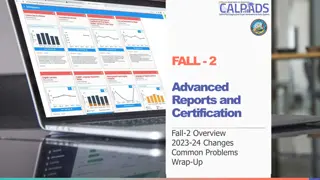
Biden's Tax Policy Outlook and Impacts on Senate Majority
Explore the potential tax policy implications during President Biden's first term, including proposed tax increases, revenue impacts, distributional changes, and the influence of Senate majority composition. Understand the potential scenarios if Democrats do not secure a Senate majority and the implications of a Republican Senate on tax policy decisions.
Download Presentation

Please find below an Image/Link to download the presentation.
The content on the website is provided AS IS for your information and personal use only. It may not be sold, licensed, or shared on other websites without obtaining consent from the author. If you encounter any issues during the download, it is possible that the publisher has removed the file from their server.
You are allowed to download the files provided on this website for personal or commercial use, subject to the condition that they are used lawfully. All files are the property of their respective owners.
The content on the website is provided AS IS for your information and personal use only. It may not be sold, licensed, or shared on other websites without obtaining consent from the author.
E N D
Presentation Transcript
Tax Policy During Bidens First Term Kyle Pomerleau, Resident Fellow November 18, 2020
Tax Policy During Bidens First Term Biden ran on a major tax increase that relies on a Democratic Senate majority. Biden may not get a Democratic Senate, but there will still be tax legislation over the next few years. Tax legislation will focus on expiring provisions and be bipartisan.
President-Elect Bidens Tax Plan His proposals would raise about $2.8 trillion over the next decade, primarily from businesses The Revenue Impact of Biden's Tax Proposals 2021-2030 $500 $400 Estate and Gift Taxes $300 $200 Business Taxes $100 Individual Income and Payroll Taxes $0 2021 2022 2023 2024 2025 2026 2027 2028 2029 2030 -$100 -$200
President-Elect Bidens Tax Plan His proposals would make the tax code significantly more progressive. Distributional Impact of Biden's Tax Proposals 2021 and 2030 Percent-change in after-tax income 15 10 5 0 -5 -10 -15 -20 Top 1% 0 10% 10 20% 20 30% 30 40% 40 50% 50 60% 60 70% 70 80% 80 90% 90 95% 95 99% 2021 2030
President-Elect Bidens Tax Plan Biden s tax policies rely on a Democratic Senate Majority. Most of his tax proposals could have been passed through what is called reconciliation. Special legislative process introduced as part of the Budget Act of 1974. Several benefits, including the ability to pass legislation in the Senate with a simple majority. Also faces several limitations: Byrd Rule. Also cannot change Social Security taxes and spending Lawmakers used reconciliation for both the 2017 tax act and the Bush tax cuts. Reconciliation would allow Biden to pass most of his tax proposals, but not all of them
Will there be a Democratic majority in the Senate? Democrats gained one seat in the Senate, but currently have 48 seats (including Sanders (VT) and King (ME) and Republicans have 50. Georgia run-off elections will decide the final balance, but Democrats will end up with 50 seats at most. Possible outcome: President Joe Biden, Democratic House Majority, (small) Republican Senate Majority.
What Does a Republican Senate Mean for Tax Policy? Biden is unlikely to get his tax priorities through a Republican Senate. However, this doesn t mean nothing happens over the next two years. Look to changes scheduled in current law: The 2017 tax act. CARES Act tax cuts. Other expiring provisions.
Scheduled Tax Changes Over the Next Few Years The 2017 Tax Act included several scheduled tax increases over the decade. 2022: -The limitation on net interest expense changes from 30% of EBITDA to 30% of EBIT -Research and development expenses will no longer by expensed and need to amortized over five years. 2023: -100% bonus depreciation starts to phase out; declines to 80%. 2024: -Bonus depreciation declines to 60%. 2025: -Bonus depreciation declines to 40%. 2026: -Bonus depreciation declines to 20%. -Most individual income tax provisions in revert to pre-2017 levels. -Estate tax reverts to pre-TCJA policy. -Tax rate on GILTI, FDII, and BEAT rise. 2027: -Bonus depreciation expires
Scheduled Tax Changes Over the Next Few Years The 2020 CARES Act included several temporary tax changes that expire at the end of this year: Individual Provisions: Allow above-the-line deduction for charitable contributions Exclusion of employer-paid student loan payments Modified limitation on charitable contribution deduction Suspension of the excess loss limitation Business Provisions: Suspended the limitation of Net Operating Loss Deductions Lifted the limit on net interest expense deduction from 30% of EBITDA to 50% of EBITDA Suspension of certain aviation taxes Employee retention credit
Scheduled Tax Changes Over the Next Few Years Other expiring tax provisions at the end of 2020 (extenders): Individual Provisions: Tax exclusion for canceled mortgage debt Mortgage insurance premium deduction Above-the-line deduction for qualified tuition and related expenses Health coverage tax credit 7.5% floor for medical expense deduction Business Provisions: Accelerated depreciation for certain entertainment expenses, motorsport entertainment complexes, racehorses, business property on an Indian reservation Empowerment Zone tax incentives New Market Tax Credit Indian Employment Tax Credit Work Opportunity Tax Credit Look-through treatment of payments between related CFCs
What sort of tax legislation could we see? Three vehicles for tax legislation over the next couple of years (not exclusive) COVID-19 Relief Package Extenders Package Bipartisan agreement Each of these require bipartisan agreement and could include both Republican tax priorities and Democratic priorities. Child tax credit and refundable tax credits Business deductions
Concluding Thoughts Even if Democrats get the Senate, it doesn t mean Biden gets his whole agenda. Ultimately, we may see more tax cuts than tax increases. Lawmakers are unlikely to take up the individual income tax increases scheduled for 2026. Taxpayers may be winners, but the federal government may be a loser with larger deficits.
Questions? Kyle Pomerleau Kyle.Pomerleau@aei.org @kpomerleau





















